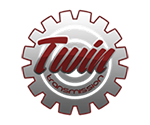
If you’ve read about manual transmissions, you know that an engine is connected to a transmission by way of a clutch. Without this connection, a car would not be able to come to a complete stop without killing the engine. But cars with an automatic transmission have no clutch that disconnects the transmission from the engine. Instead, they use an amazing device called a torque converter. The transmission torque converter is an important part of your vehicle and a lot of harmful things can happen if it fails.
Signs your vehicle needs a torque converter repair or auto repair:
Overheating
•Overheating is perhaps the most common Torque Converter problem, and usually occurs when there is a transmission fluid pressure drop, as might occur when the fluid is too low or the filter is clogged. Overheating can render the elastomer seals in the converter ineffective. The seals’ inability to perform their intended function of holding liquid can lead to leaks.
Shudder
•Torque Converter shudder feels like driving over a heavily washboarded dirt road when accelerating. This is usually symptomatic of previously overheated or currently overheating transmission fluid.
Slippage
•This is another common Torque Converter problem, and causes your car to resist acceleration while the engine continues to rev. The most common cause is low or overheated transmission fluid. Continuous high levels of slippage may overwhelm the converter’s ability to dissipate heat, resulting in damage to the elastomer seals that retain fluid inside the converter. This will cause the unit to leak and eventually stop functioning due to lack of fluid.
Debris in transmission Oil
•If your transmission fluid dipstick has flakes of black material stuck to it, either your transmission or torque converter clutches are damaged. Repair is not necessarily required, unless other symptoms manifest.
Blade deformation and fragmentation
•Due to abrupt loading or excessive heating of the converter, the pump and/or turbine blades may be deformed, separated from their hubs and/or annular rings, or may break up into fragments. At the least, such a failure will result in a significant loss of efficiency, producing symptoms similar (although less pronounced) to those accompanying stator clutch failure. In extreme cases, catastrophic destruction of the converter will occur.
Ballooning
•Prolonged operation under excessive loading, very abrupt application of load, or operating a torque converter at very high RPM may cause the shape of the converter’s housing to be physically distorted due to internal pressure and/or the stress imposed by centrifugal force. Under extreme conditions, ballooning will cause the converter housing to rupture, resulting in the violent dispersal of hot oil and metal fragments over a wide area.
Poor Fuel Economy
•This is generally related to converter slippage, but may also be a sign that your Torque Converter’s internal clutches are not locking up when they should be.
Benefits and Weak Points of a Torque Converter:
In addition to the very important job of allowing your car come to a complete stop without stalling the engine, the torque converter actually gives your car more torque when you accelerate out of a stop. Modern torque converters can multiply the torque of the engine by two to three times. This effect only happens when the engine is turning much faster than the transmission.
At higher speeds, the transmission catches up to the engine, eventually moving at almost the same speed. Ideally, though, the transmission would move at exactly the same speed as the engine, because this difference in speed wastes power. This is part of the reason why cars with automatic transmissions get worse gas mileage than cars with manual transmissions.
To counter this effect, some cars have a torque converter with a lockup clutch. When the two halves of the torque converter get up to speed, this clutch locks them together, eliminating the slippage and improving efficiency.
Twin Automotive, known as the Transmission King of Charlotte, can help you with any auto repair or transmission repair, including torque converter repair. If you think you have a torque converter problem, please contact us at 704-821-3460 to speak to a repair specialist for a diagnostic of your problem.
Twin Automotive serves all Charlotte NC Areas including Matthews NC, MOnroe NC, Stallings NC, Waxhaw NC, Indian Trail NC, Ballantyne NC, Pineville NC, Fort Mill SC, Concord NC, Mooresville NC and all other areas.
